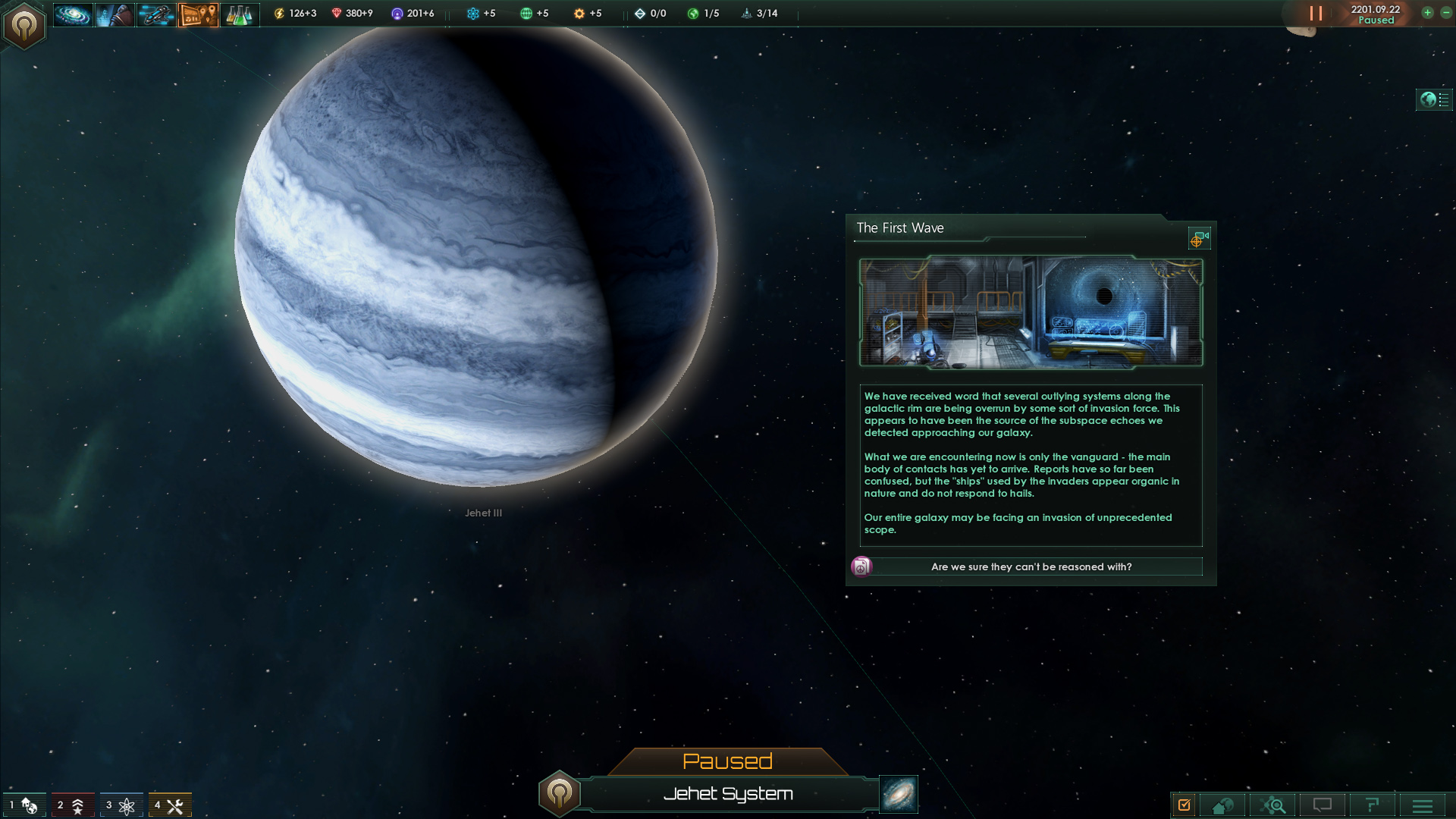Hi folks!
We’re getting close to release and there is not much left to talk about that we haven’t already covered. The only remaining major feature is, I believe, the “Late Game Crises” events, and I really don’t want to spoil them, so bear with me if I’m being slightly vague this time…

Now, last week I talked about how large empires will have to worry about keeping all manner of political Factions in check. This is one of the ways we try to keep the game interesting and challenging past that crucial point when you often tend to lose interest in most strategy games and feel that you’ve already won. It’s not much fun to spend hours of your life mopping up the final resistance just so you’ll get to see that sweet acknowledgement saying “Victory!”. Another way to keep a game interesting is through random occurrences that can upset your plans even at a very late stage. This is where dangerous technologies and late game crises enter the picture.

Some technologies are clearly marked as being “risky”, for example Robot Workers. Now, you might not always risk having your victory snatched out of your grasp, but in this case at least, you really are gambling with the fate of the galaxy. Just researching such a technology is safe; it’s the actual use of it that carries the danger. For example, the more sentient Robot Pops there are in the galaxy, the higher the risk is that they will come to deem organic life unfit to exist and rise up in a well-planned revolt. Unless crushed quickly and with overwhelming force, such a Machine Empire will quickly get out of hand and threaten all the remaining empires in the galaxy. Sentient robots will out-research and outproduce everyone. If the revolt is centered in a powerful rival empire, you’ll need to think carefully about when you want to intervene; a savvy player might time it just right and be able to mop up both the robots and the remnants of the rival empire. Leave it too long, however, and the robots will overwhelm you.

The idea is that you will usually see one of the possible late game crises every time you play, but the chances increase the longer it takes you to win. However, it’s very rare to see more than one in the same game. The different threats vary in nature and behaviour, and can offer opportunities as well as posing an enormous danger to your survival. For example, it might be possible to reverse engineer some really unique technologies from these galactic threats, but the geography of the galaxy might also change in your favor…
That’s it for now my friends! Next week, we’ll change tack completely, and do a two-part, in-depth guide for modders.
We’re getting close to release and there is not much left to talk about that we haven’t already covered. The only remaining major feature is, I believe, the “Late Game Crises” events, and I really don’t want to spoil them, so bear with me if I’m being slightly vague this time…

Now, last week I talked about how large empires will have to worry about keeping all manner of political Factions in check. This is one of the ways we try to keep the game interesting and challenging past that crucial point when you often tend to lose interest in most strategy games and feel that you’ve already won. It’s not much fun to spend hours of your life mopping up the final resistance just so you’ll get to see that sweet acknowledgement saying “Victory!”. Another way to keep a game interesting is through random occurrences that can upset your plans even at a very late stage. This is where dangerous technologies and late game crises enter the picture.

Some technologies are clearly marked as being “risky”, for example Robot Workers. Now, you might not always risk having your victory snatched out of your grasp, but in this case at least, you really are gambling with the fate of the galaxy. Just researching such a technology is safe; it’s the actual use of it that carries the danger. For example, the more sentient Robot Pops there are in the galaxy, the higher the risk is that they will come to deem organic life unfit to exist and rise up in a well-planned revolt. Unless crushed quickly and with overwhelming force, such a Machine Empire will quickly get out of hand and threaten all the remaining empires in the galaxy. Sentient robots will out-research and outproduce everyone. If the revolt is centered in a powerful rival empire, you’ll need to think carefully about when you want to intervene; a savvy player might time it just right and be able to mop up both the robots and the remnants of the rival empire. Leave it too long, however, and the robots will overwhelm you.

The idea is that you will usually see one of the possible late game crises every time you play, but the chances increase the longer it takes you to win. However, it’s very rare to see more than one in the same game. The different threats vary in nature and behaviour, and can offer opportunities as well as posing an enormous danger to your survival. For example, it might be possible to reverse engineer some really unique technologies from these galactic threats, but the geography of the galaxy might also change in your favor…
That’s it for now my friends! Next week, we’ll change tack completely, and do a two-part, in-depth guide for modders.

